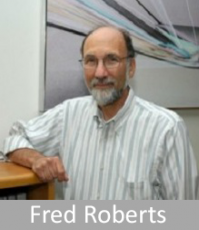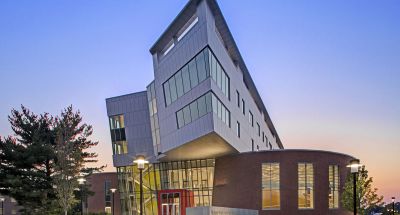November 2021
 Rutgers University is part of a new Center of Excellence (COE) selected by the Department of Homeland Security (DHS) for Engineering Secure Environments from Targeted Attacks. The new COE is led by Northeastern University, and its Rutgers team is guided by CCICADA Director Fred Roberts and Midge Cozzens, Education Director of both CCICADA and DIMACS.
Rutgers University is part of a new Center of Excellence (COE) selected by the Department of Homeland Security (DHS) for Engineering Secure Environments from Targeted Attacks. The new COE is led by Northeastern University, and its Rutgers team is guided by CCICADA Director Fred Roberts and Midge Cozzens, Education Director of both CCICADA and DIMACS.
The newly minted center combines the strengths of three “emeritus” COEs that have each worked with DHS for more than a decade—ALERT (led by Northeastern), CCICADA (led by Rutgers), and CREATE (led by USC). Together with other partners, these three universities will form the new center, called SENTRY, to address the challenges of protecting a wide range of soft targets and crowded places (STCPs) such as stadiums, schools, and places of worship. With hundreds of thousands of STCPs across the country, and millions of people visiting them each day, the scope of the challenges is vast, but so is the potential impact.
The SENTRY team was selected to receive the nearly $37 million contract from DHS following an eight-month competition among the nation’s largest universities. Although it is new, SENTRY (which stands for Soft-target Engineering to Neutralize the Threat RealitY) brings plenty of experience. It builds on long-standing collaborations among the three veteran centers that have developed over years of mutual engagement with DHS and its partners. During this time, ALERT has amassed a strong track record of threat anomaly detection using  advanced sensor technologies and signature analysis algorithms. CREATE has developed powerful methods for assessing risks from unanticipated attacks on STCPs, and CCICADA has pioneered the protection of STCPs such as stadiums and transportation facilities.
advanced sensor technologies and signature analysis algorithms. CREATE has developed powerful methods for assessing risks from unanticipated attacks on STCPs, and CCICADA has pioneered the protection of STCPs such as stadiums and transportation facilities.
In commenting on the new award, Fred Roberts said “We owe our success in stadium and large venue security to the many partners who have shared their expertise and welcomed us to their venues to test our ideas. These include MetLife Stadium, the Prudential Center, Yankees, Mets, Cleveland Indians, Detroit Tigers, Detroit Red Wings, Port Authority Bus Terminal in New York City, New Jersey Office of Homeland Security and Preparedness, Rutgers Office of Emergency Management, and many others. Several of them will be serving on an Advisory Board for the new COE.”
A novel line of research in homeland security and computational modeling has demonstrated that  human behavior is influenced by architectural design and suggests that even modest changes in a building’s design or redesign can have a major influence on how a crowd behaves during an emergency. A Rutgers team consisting of Roberts, Civil and Environmental Engineering faculty members Jie Gong and Jing Jin, and Computer Science faculty member Mubbasir Kapadia will lead research to develop algorithms and technologies needed for real-time crowd behavior forecasting as it relates to building design.
human behavior is influenced by architectural design and suggests that even modest changes in a building’s design or redesign can have a major influence on how a crowd behaves during an emergency. A Rutgers team consisting of Roberts, Civil and Environmental Engineering faculty members Jie Gong and Jing Jin, and Computer Science faculty member Mubbasir Kapadia will lead research to develop algorithms and technologies needed for real-time crowd behavior forecasting as it relates to building design.
The same Rutgers team will also build and experiment with “Dynamic Digital Twins” in a state-of-the-art physical digital twin facility at the Rutgers Richard Weeks School of Engineering testbed. Through this testbed, they will collect data, build models, and conduct analyses in a dynamic digital twin framework to inform stakeholders such as venue operators and security directors about ways to redesign and reengineer existing public spaces to make them more resilient to a variety of threats. These threats include not only intentional acts such as shootings and terrorist attacks, but also fires, earthquakes, lightning storms, and other incidents that may cause crowd surges and panic.
The new SENTRY Center of Excellence will take advantage of the Rutgers “Living Lab”, which provides access to campus spaces and opportunities to observe buildings and people. The Living Lab facilities include a football stadium that seats over 50,000 fans,  a smaller soccer stadium, a basketball arena, hospital facilities, dining halls, dormitories, an extensive bus system, and other contextually relevant environments that will allow us to test the research ideas for protection of soft targets. (You can learn more about the Rutgers Living Lab and its role in SENTRY by watching this video.)
a smaller soccer stadium, a basketball arena, hospital facilities, dining halls, dormitories, an extensive bus system, and other contextually relevant environments that will allow us to test the research ideas for protection of soft targets. (You can learn more about the Rutgers Living Lab and its role in SENTRY by watching this video.)
A major goal of the DHS COEs is to train the homeland security workforce of the future and to help create a diverse and inclusive workforce that reflects and benefits from the nation’s diversity. Midge Cozzens will co-lead Education at SENTRY and will direct two key programs. The first will develop instructional modules that bring security topics and techniques into community college and undergraduate classrooms in a way that emphasizes the methods and tools of mathematics and computing and illustrates their role in planning for a secure environment. This program draws on Cozzens’s past experience leading projects that developed sets of modules on topics such as mathematical biology, computational thinking, sustainability, and a variety of homeland security topics.
Cozzens will also direct SENTRY’s Reconnect program, which will be modeled on the Reconnect programs of DIMACS and CCICADA that Cozzens has led for many years. SENTRY Reconnect will offer intensive week-long summer workshops for faculty teaching at the community college and undergraduate level to expose them to new areas of research within the mathematical, computer sciences and engineering communities that are relevant to homeland security and in particular the themes of SENTRY. Reconnect topics are presented in a series of lectures and activities led by leading experts in the field and participants are involved in writing curricular materials that are useful in the classroom. Reconnect workshops will be a vehicle to invite broad participation of underrepresented groups, especially from community colleges and minority-serving institutions (MSIs), in SENTRY’s effort to protect STCPs. Quoting Cozzens, “Over the years, Reconnect has been extremely successful in attracting MSI faculty as participants in workshops, and in some cases, even as hosts of them. I am delighted that SENTRY will provide the resources to sustain, evolve, and grow this impactful program.”
SENTRY will be directed by Michael Silevitch, the Robert D. Black Distinguished Professor of Electrical and Computer Engineering at Northeastern. In a press release issued by Northeastern, Silevitch stressed the importance of multi-disciplinary expertise, particularly bringing together engineering and architecture to engineer safer spaces. About his role in the new center, he says, “It is an honor and a major responsibility to lead the SENTRY effort to help protect our nation against incipient soft target attacks.”
SENTRY joins CCICADA as part of DHS’s university-based network of Centers of Excellence. The network is comprised of fifteen centers nationally—some emeritus and some with current center grants—each with a specific security focus.
Printable version of this story: [PDF]


